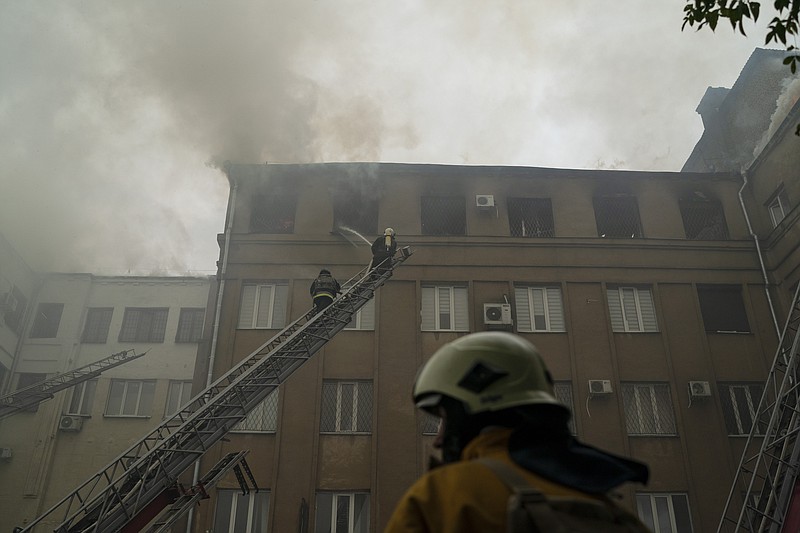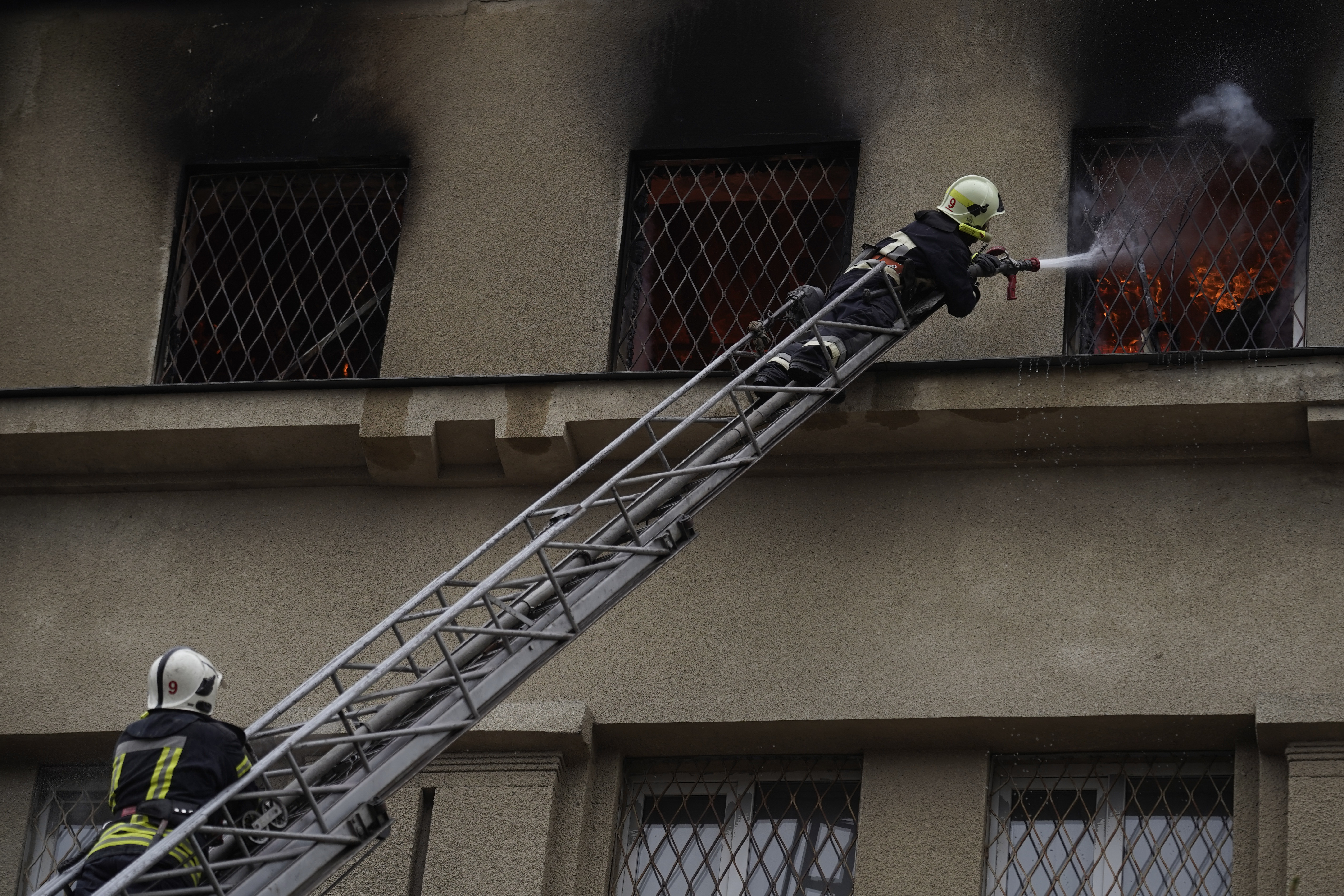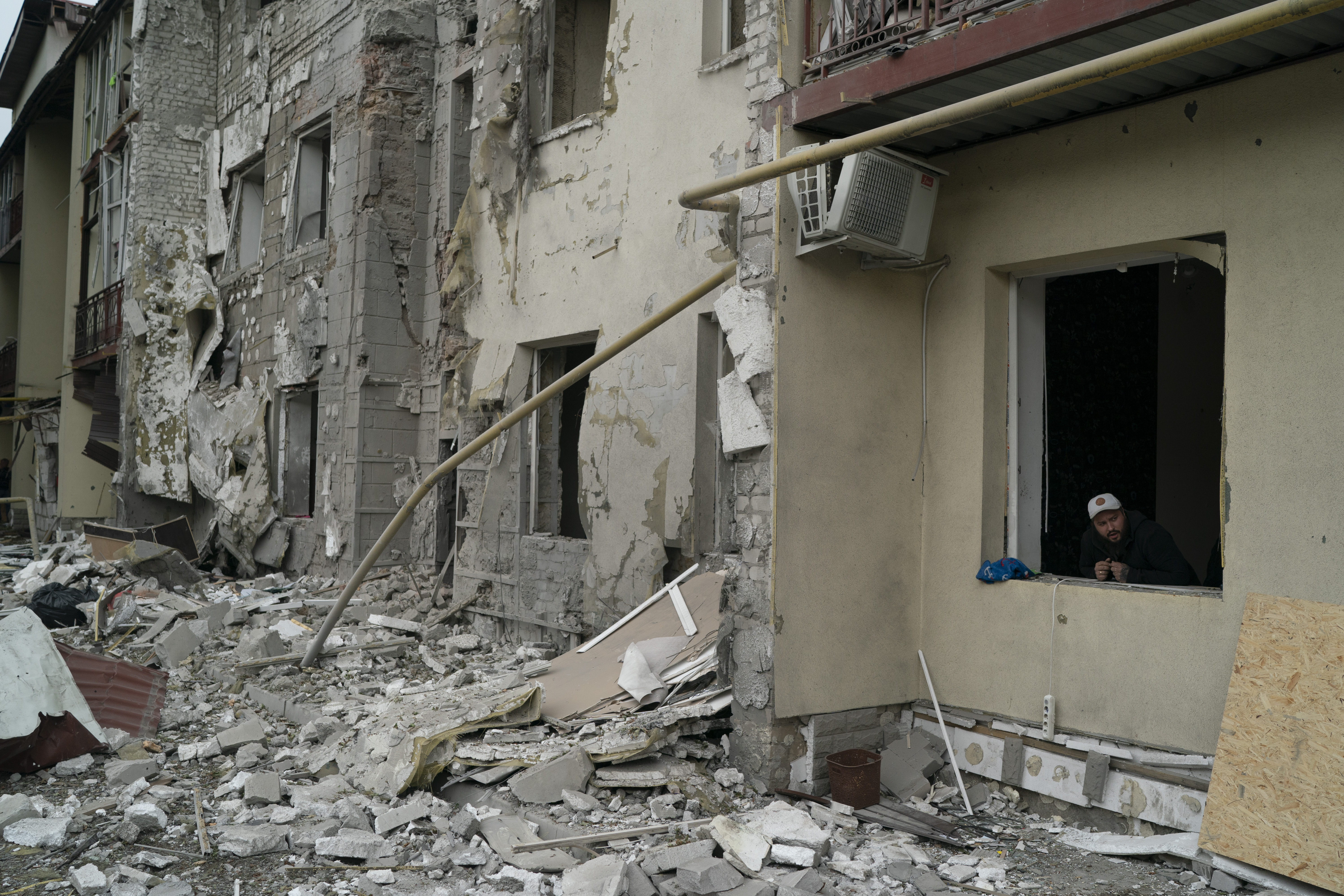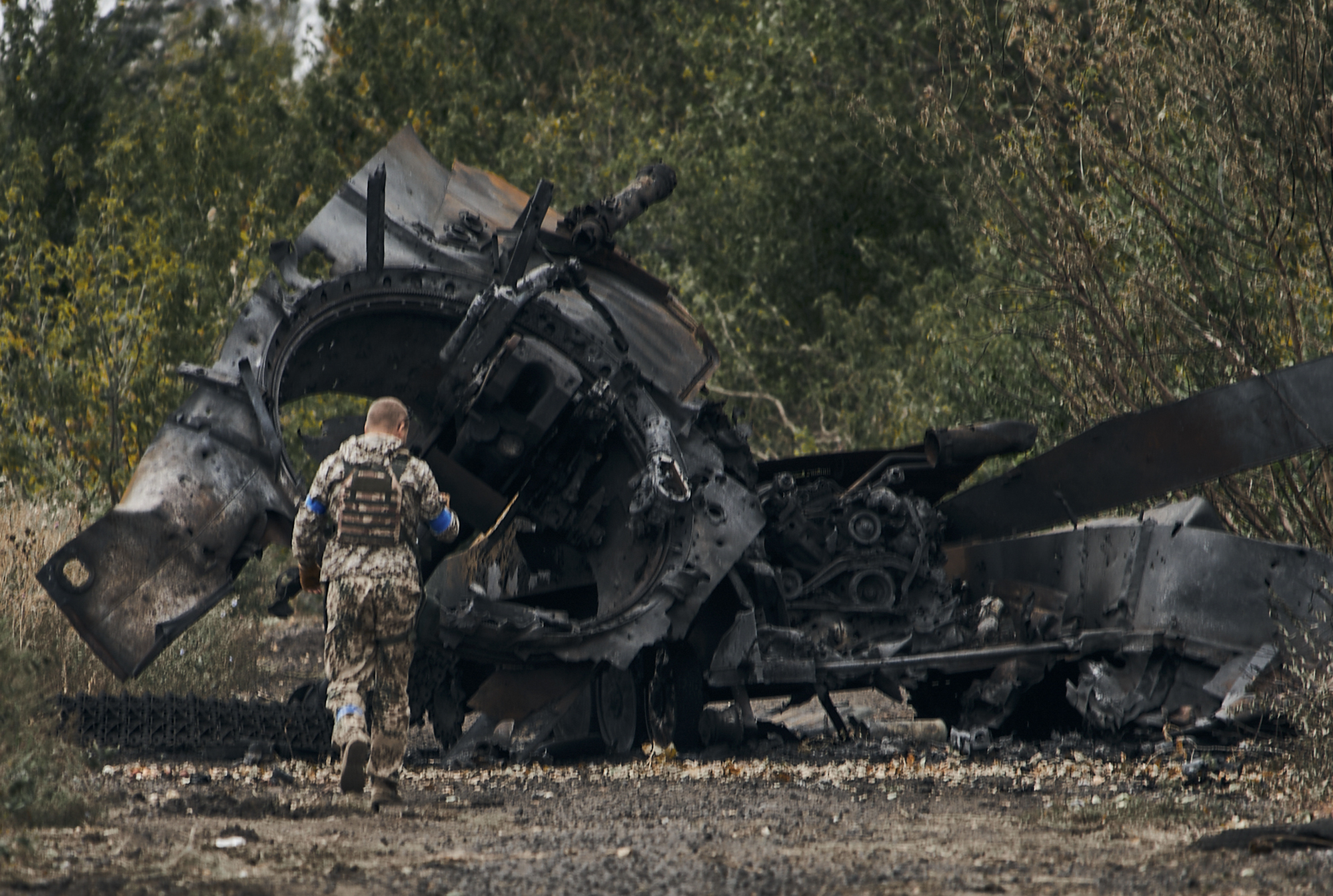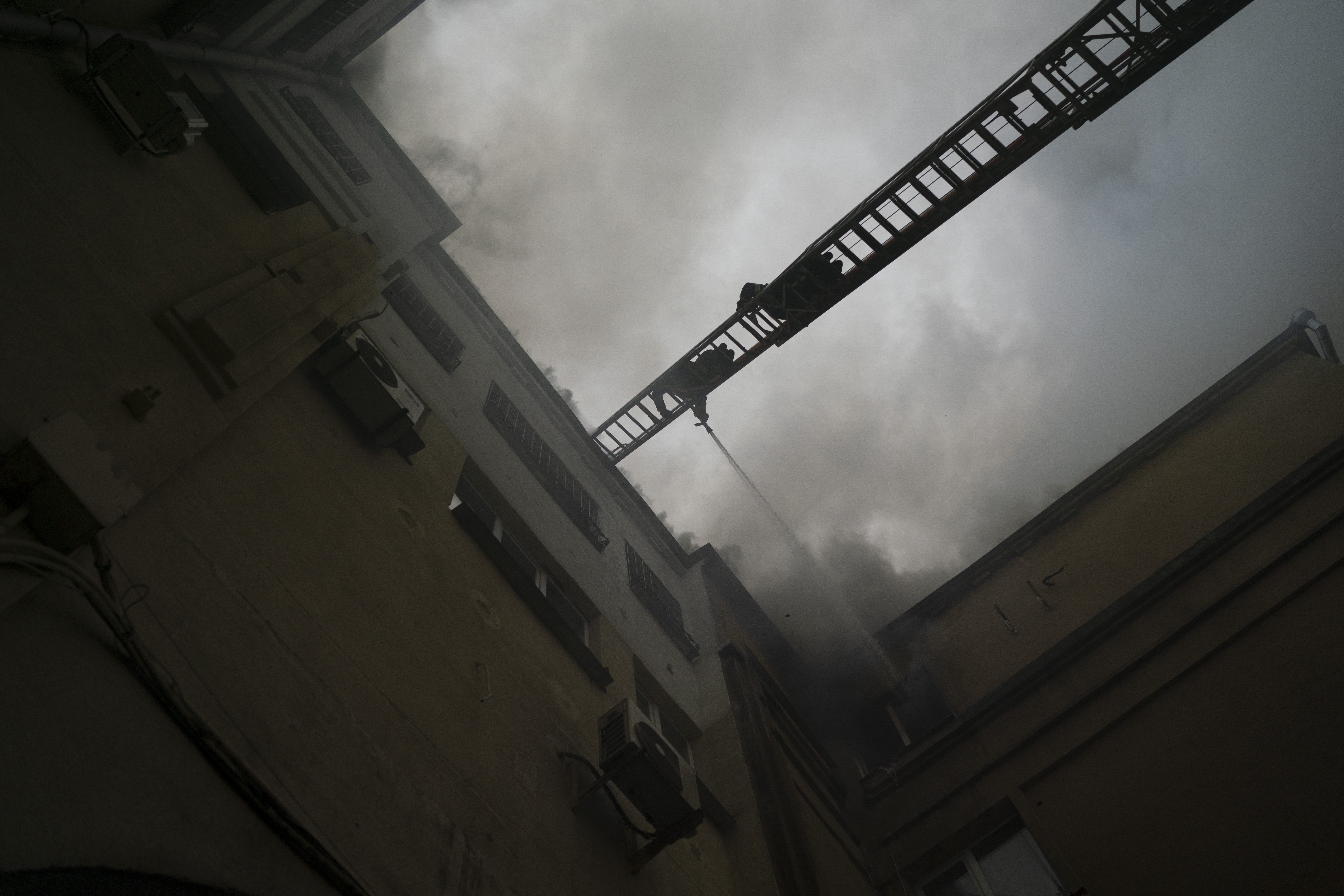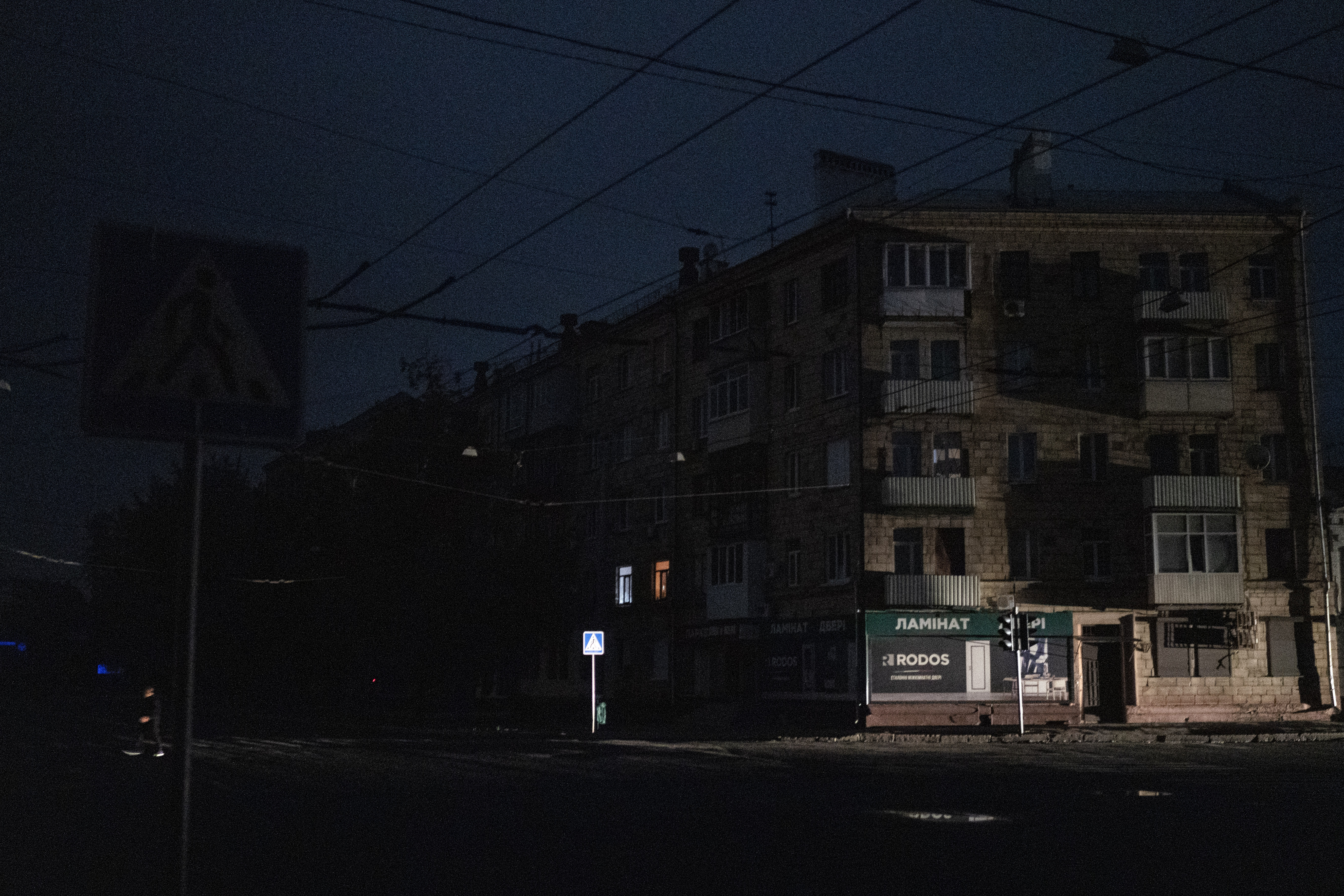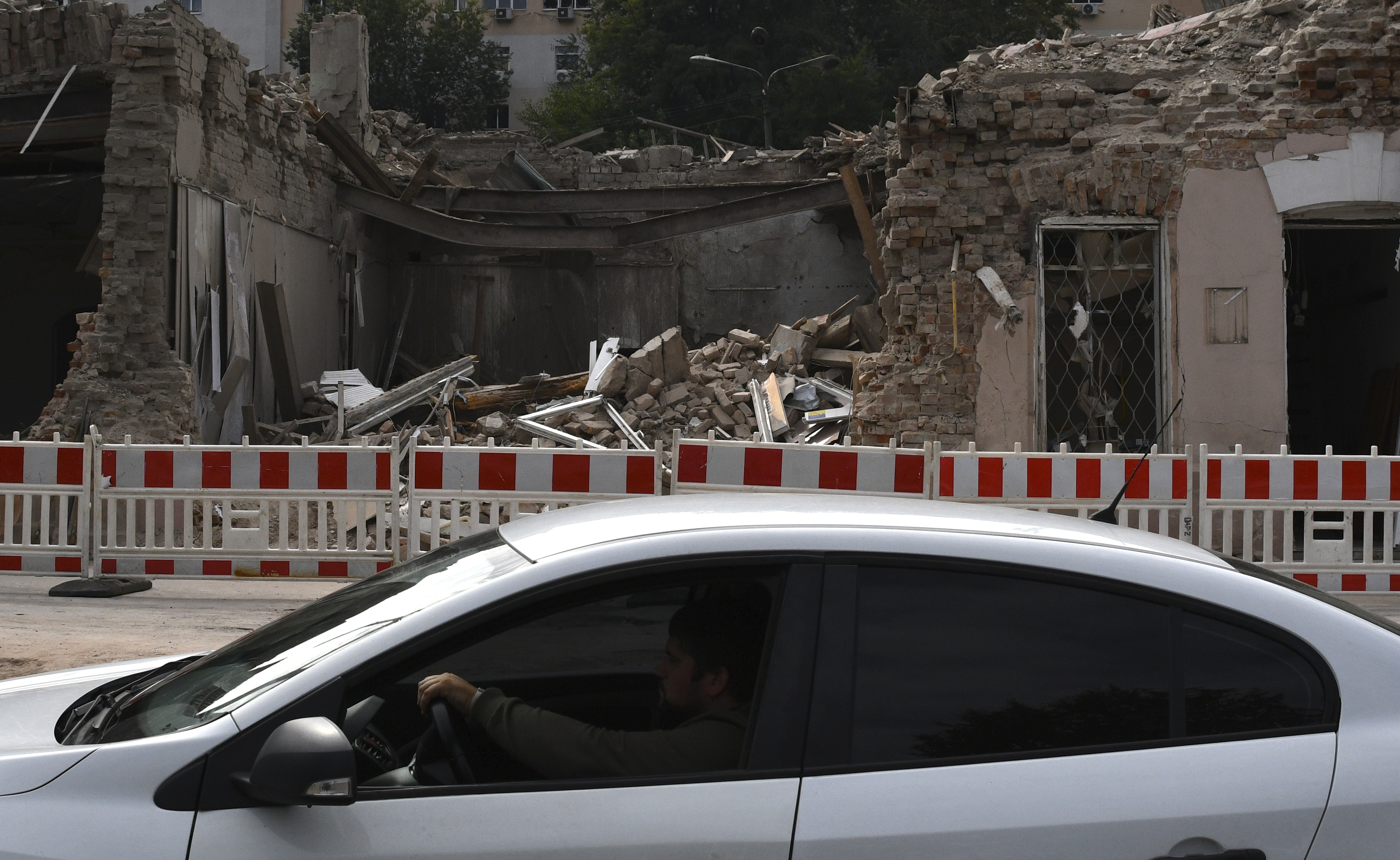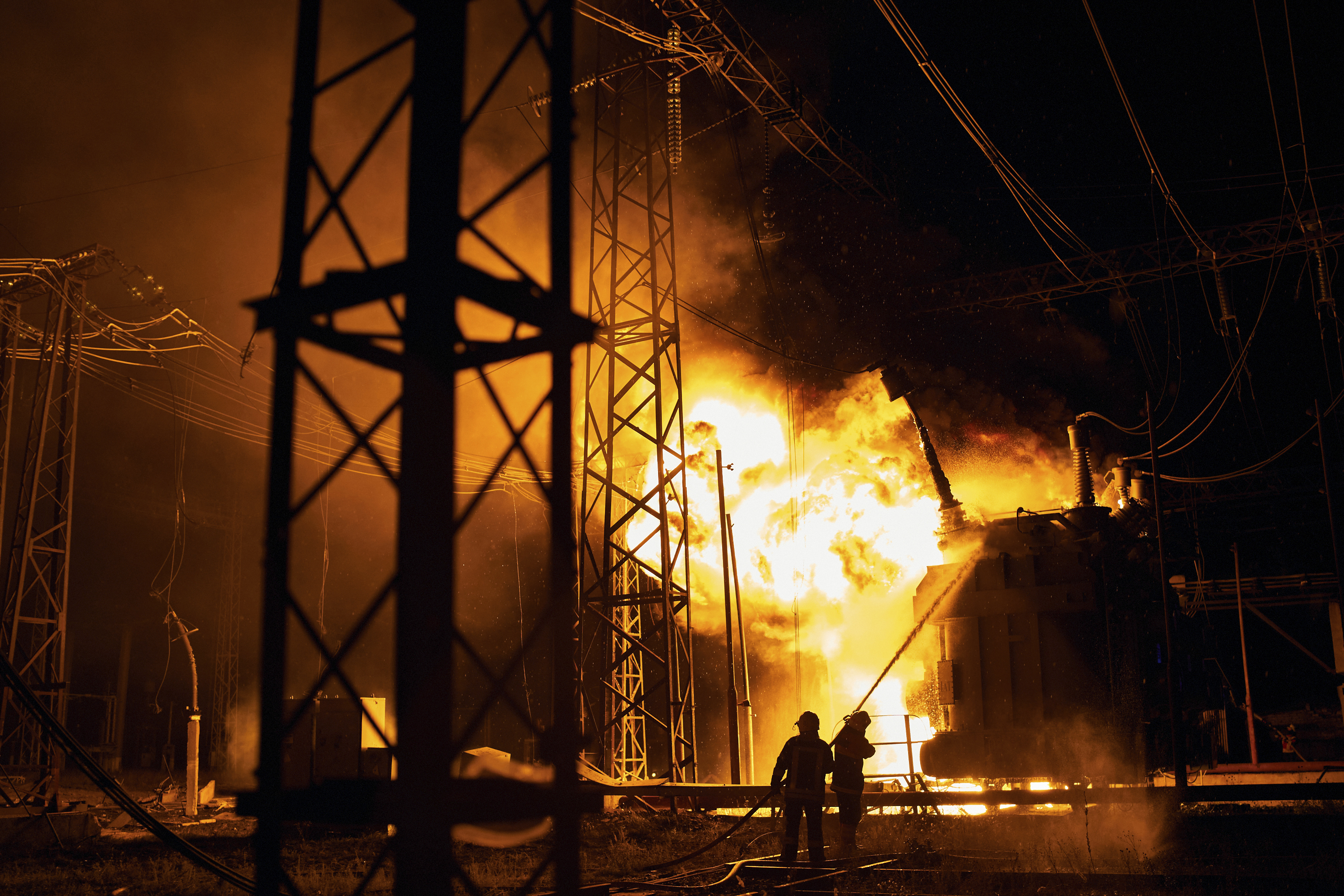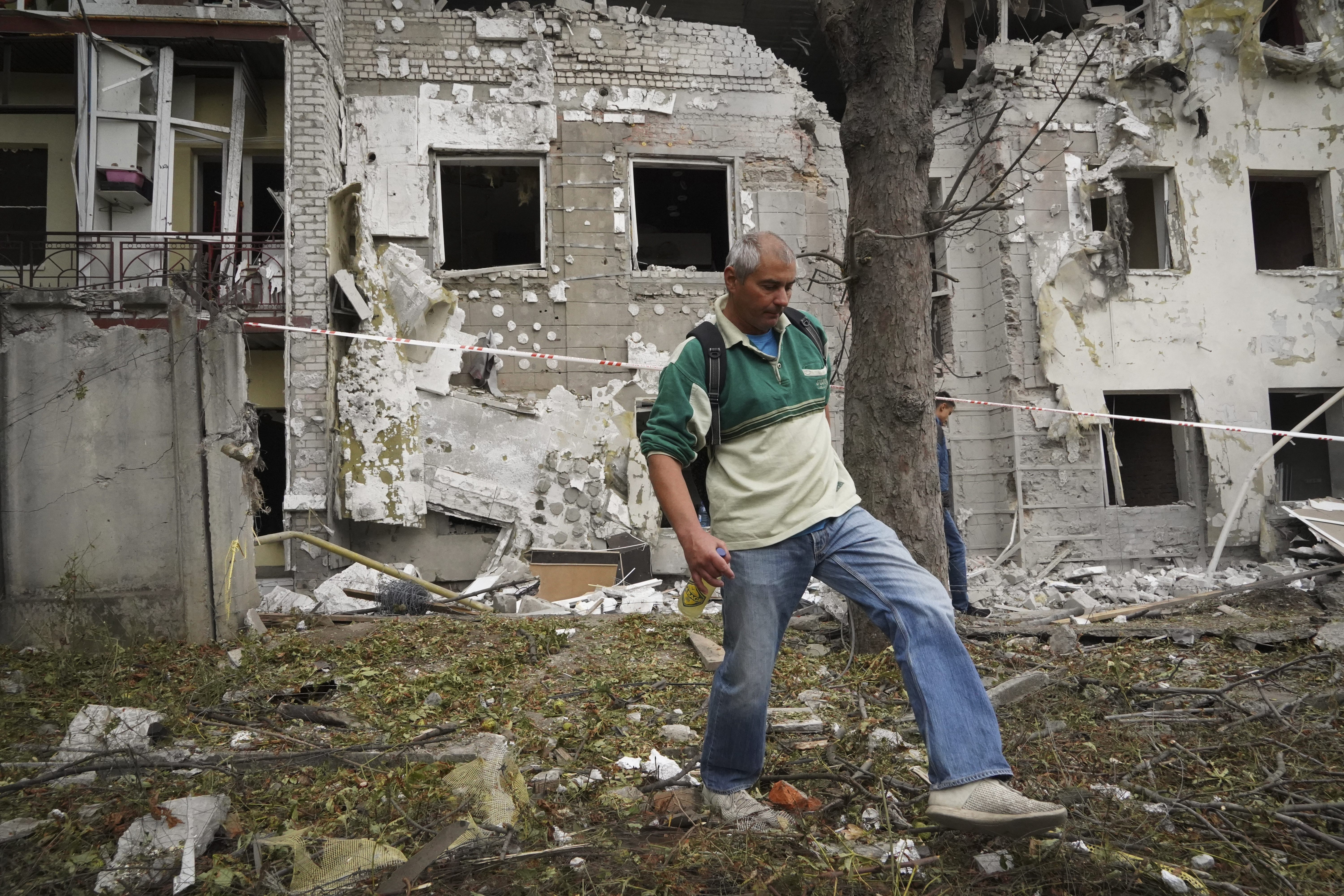KHARKIV, Ukraine -- Ukrainian troops expanded their territorial gains Monday, pushing all the way to the country's northeastern border in places, and claimed to have captured a record number of Russian soldiers as part of the lightning advance that forced Moscow to make a hasty retreat.
A spokesman for Ukrainian military intelligence said Russian troops were surrendering en masse as "they understand the hopelessness of their situation." A Ukrainian presidential adviser said there were so many POWs that the country was running out of space to accommodate them.
Blue-and-yellow Ukrainian flags fluttered over newly liberated towns across a wide swath of reclaimed land. The Ukrainian military said it had freed more than 20 settlements in 24 hours. In recent days, Kyiv's forces have captured territory at least twice the size of greater London, according to the British Defense Ministry.
After months of little discernible movement on the battlefield, the momentum has lifted Ukrainian morale and provoked rare public criticism of Russian President Vladimir Putin's war.
"In some areas of the front, our defenders reached the state border with the Russian Federation," said Oleh Syniehubov, governor of the northeastern Kharkiv region.
The counteroffensive left the Kremlin struggling for a response to its largest military defeat in Ukraine since Russian forces pulled back from areas near Kyiv after a botched attempt to capture the capital early in the invasion.
The Russian Defense Ministry acknowledged the setback in a map that showed its troops pressed back along a narrow patch of land on the border with Russia -- a tacit admission of big Ukrainian gains.
Reports of chaos abounded as Russian troops pulled out.
"The Russians were here in the morning. Then at noon, they suddenly started shouting wildly and began to run away, charging off in tanks and armored vehicles," Dmytro Hrushchenko, a resident of recently liberated Zaliznychne, a small town near the eastern front line, told Sky News.
Video taken by the Ukrainian military showed soldiers raising the Ukrainian flag over battle-damaged buildings. In one scene, a fighter wiped his boots on a Russian flag on the ground. Other videos showed Ukrainians inspecting the wreckage of Russian military vehicles, including tanks.
In his evening address, Ukrainian President Volodymyr Zelenskyy said his forces have liberated more than 2,300 square miles in the east and the south since the beginning of September.
Now Ukrainian teams are disarming land mines and other unexploded weapons in the recaptured areas and searching for any remaining Russian troops, officials said.
It was not yet clear if the Ukrainian blitz could signal a turning point in the war. Momentum has switched back and forth before, but rarely with such a big and sudden swing.
Ukrainian presidential adviser Oleksiy Arestovich did not specify the number of Russian prisoners but said the POWs would be exchanged for Ukrainian service members held by Moscow. Military intelligence spokesman Andrey Yusov said the captured troops included "significant" numbers of Russian officers.
Ukraine's deputy interior minister accused fleeing Russian forces of burning official documents and concealing bodies in an attempt to cover up rights violations in the areas they controlled until last week.
The mood was jubilant across the country.
In Kharkiv, Ukraine's second-largest city and the capital of the region where the gains have been made, authorities hailed that power and water had been restored to about 80% of the region's population following Russian attacks on infrastructure that knocked out electricity in many places across Ukraine.
"You are heroes!!!" Kharkiv Mayor Ihor Terekhov wrote on Telegram, referring to crews who restored utilities. "Thanks to everyone who did everything possible on this most difficult night for Kharkiv to normalize the life of the city as soon as possible."
Meanwhile in Russia, signs of disarray emerged as Russian military bloggers and other commentators chastised the Kremlin for failing to mobilize more forces and take stronger action against Ukraine.
Russia has continuously stopped short of calling its invasion a war, instead describing it as a "special military operation" and relying on a limited contingent of volunteers instead of a mass mobilization that could spur civil discontent and protest.
Ramzan Kadyrov, the Moscow-backed leader of the Russian region of Chechnya, publicly criticized the Russian Defense Ministry for what he called "mistakes" that made the Ukrainian blitz possible.
Even more notable, such criticism seeped onto state-controlled Russian TV.
"People who convinced President Putin that the operation will be fast and effective ... these people really set up all of us," Boris Nadezhdin, a former parliament member, said on a talk show on NTV television. "We're now at the point where we have to understand that it's absolutely impossible to defeat Ukraine using these resources and colonial war methods."
Some in Russia blamed Western weapons and fighters for the losses.
"It's not Ukraine that attacked Izium, but NATO," read a headline in the state-supported Komsomolskaya Pravda newspaper, referring to one of the areas where Russia said it has withdrawn troops.
Elsewhere, residents of a Russian village just across the border from Ukraine were evacuated after shelling by Ukrainian troops killed one person, according to Russia's Tass news agency.
The report cited the head of the local administration in Logachevka, who said Ukrainian troops opened fire at a border checkpoint.
Pro-Kremlin separatists reported that Ukrainian troops were approaching the town of Lyman, a rail hub captured by Russia in late May that offers access to bridges over the nearby Siversky Donets river.
Denis Pushilin, head of the self-proclaimed Donetsk People's Republic, acknowledged that the situation was "difficult."
Even amid Ukraine's ebullience, the casualties kept mounting. Ukraine's presidential office said Monday that at least four civilians were killed and 11 others wounded in a series of Russian attacks in nine regions of the country. The U.N. Human Rights Office said last week that 5,767 civilians have been killed so far.
Among Monday's attacks were strikes on residential areas in Kharkiv that killed at least one civilian and set multiple fires, local officials said.
In a reminder of the war's toll, a council member in Izium accused enemy forces of killing civilians and committing other atrocities. Maksym Strelnikov told reporters Monday in an online briefing that hundreds of people had died during the fighting and after Russia seized the town in March.
Many died from shelling and could not get a proper burial, he said. His claims could not be immediately verified, but similar scenes have played out in other places captured by Russian forces.
The Ukrainian military also claimed to have found more evidence of human-rights violations by Russian occupiers. It did not elaborate.
Izium was a major base for Russian forces in the Kharkiv region. The first Ukrainian flag was raised over the city on Saturday, according to Strelnikov. Residents, some wrapped in the country's flag, greeted Ukrainian forces and offered them food.
NUCLEAR PLANT DANGER CONTINUES
Ukraine said the Russians continued shelling Nikopol across the Dnieper River from the Zaporizhzhia power plant, damaging several buildings there and leaving Europe's largest nuclear facility in a precarious position. The last operational reactor in that plant has been shut down in a bid to prevent a radiation disaster as fighting raged nearby.
The head of the United Nations' nuclear watchdog agency said Monday that there were active negotiations with both Ukraine and Russia to end military actions in and around the Zaporizhzhia Nuclear Power Plant.
The nuclear complex in southern Ukraine -- Europe's largest -- has been imperiled by frequent shelling, raising global fears of a nuclear catastrophe.
"I have seen signs that they are interested in this agreement," Rafael Mariano Grossi, the director general of the International Atomic Energy Agency, said at a news conference. While Grossi declined to go into details given the delicate diplomacy involved, he said he had witnessed "two sides that are engaging with us and are asking questions, lots of questions."
Grossi visited the plant last week with a team of inspectors from the agency, two of whom remained behind and will stay in place for the foreseeable future. The nuclear facility is occupied by Russian forces but is still being operated by Ukrainian engineers taking orders from Ukrainian energy officials.
The International Atomic Energy Agency has called for the establishment of a "safety and security protection zone" around the facility, but it does not have the authority to order a cease-fire or to demand that Russian forces leave the plant.
Grossi's comments Monday suggested that what is under discussion is something less than a demilitarized zone and perhaps more like an agreement to silence arms in and around the plant.
Since the war began -- and especially since shells started landing in and around the facility early last month -- nuclear engineers working under great stress have been racing to address one crisis after another to prevent a nuclear accident.
Ukraine and Russia have each blamed the other for the shelling. Grossi has refrained from specifying who is responsible. He said Monday that shelling had continued despite the presence of international inspectors, insisting that hostilities must end as they continue to pose a danger even after all six reactors at the plant have been shut down.
Ukraine made the decision to take the Zaporizhzhia plant offline Sunday -- a step that the Biden administration has been urging Ukrainian authorities to take for weeks. But U.S. officials have said the Ukrainians are reluctant to lose the vital source of energy. The plant, at full operation, provided about a fifth of Ukraine's electricity supply. And there is a fear that, once shut down, Russia might seek to find ways to connect it to Russia's grid, instead of Ukraine's.
Grossi said that Ukrainian officials had made it clear that they considered the plant to be a vital part of their power grid and that engineers were currently working to repair the high-voltage cables that would ultimately allow it to be brought back online.
While the decision to take the plant offline lowered the risks of a nuclear catastrophe, Grossi said that he remained gravely concerned about the plant's tenuous connection to outside power, which it has lost at least twice in the past five weeks.
Even with all the reactors now in a state known as "cold shut down," essential equipment dedicated to cooling spent fuel rods needs a constant source of power.
All four high-voltage lines connecting the plant to the Ukrainian power grid remain severed. A reserve line connected to a nearby thermal power plant is the only connection to outside power.
"Even in cold shut down," Grossi said, the plant still needs power "or there could be a nuclear accident."
Information for this article was contributed by Elena Becatoros and Hanna Arhirova of The Associated Press and by Marc Santora and David E. Sanger of The New York Times.
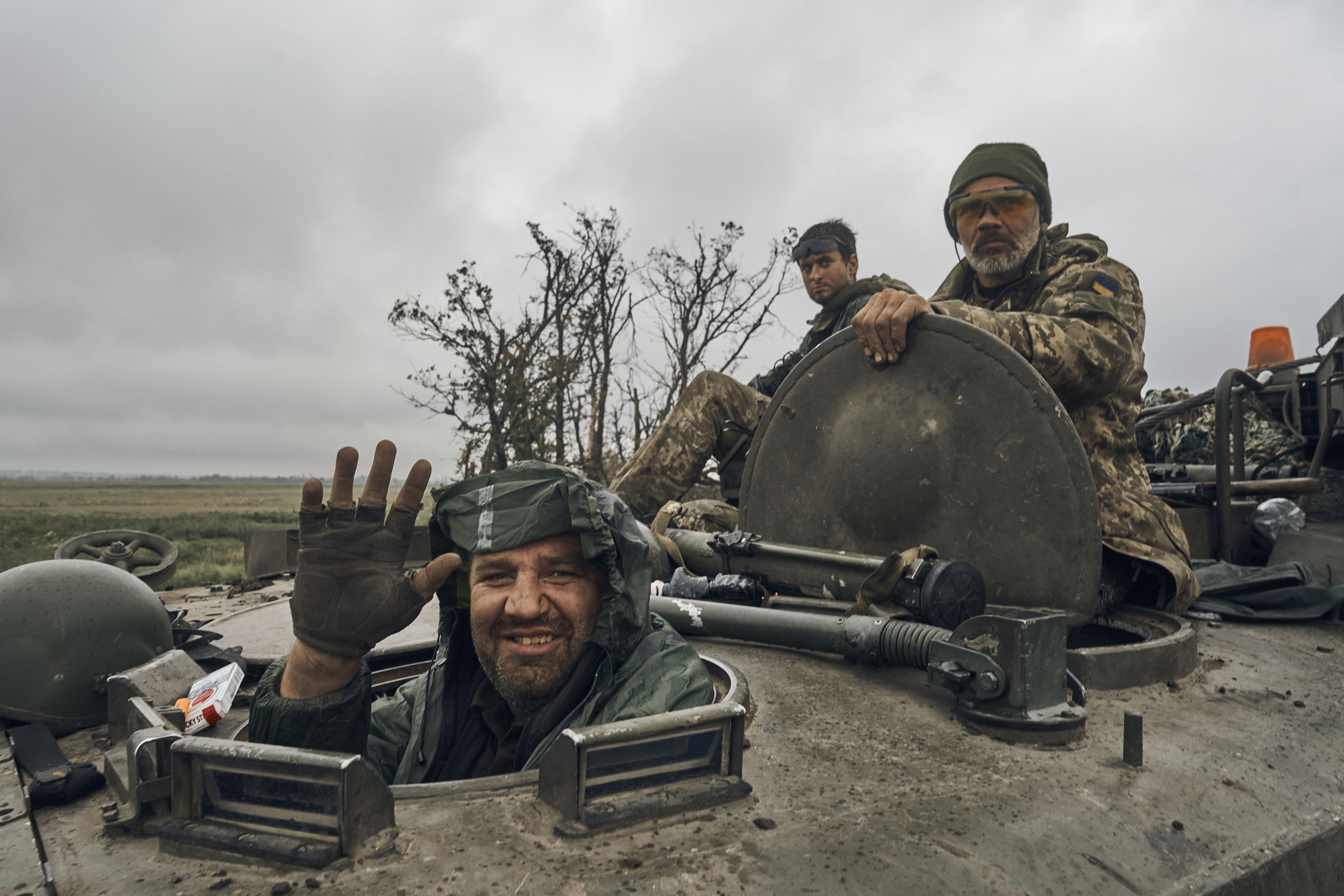 A Ukrainian soldier smiles from a military vehicle on the road in the freed territory in the Kharkiv region, Ukraine, Monday, Sept. 12, 2022. Ukrainian troops retook a wide swath of territory from Russia on Monday, pushing all the way back to the northeastern border in some places, and claimed to have captured many Russian soldiers as part of a lightning advance that forced Moscow to make a hasty retreat. (AP Photo/Kostiantyn Liberov)
A Ukrainian soldier smiles from a military vehicle on the road in the freed territory in the Kharkiv region, Ukraine, Monday, Sept. 12, 2022. Ukrainian troops retook a wide swath of territory from Russia on Monday, pushing all the way back to the northeastern border in some places, and claimed to have captured many Russian soldiers as part of a lightning advance that forced Moscow to make a hasty retreat. (AP Photo/Kostiantyn Liberov)